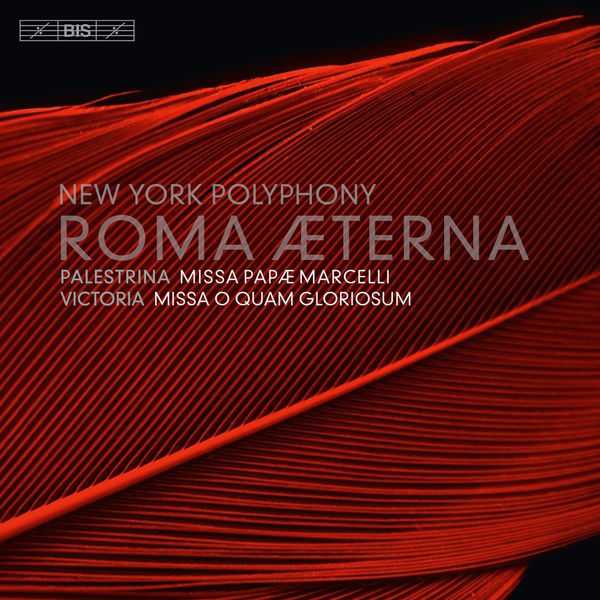
Composer: Francisco Guerrero, Giovanni Pierluigi da Palestrina, Tomás Luis de Victoria
Performer: New York Polyphony, Andrew Fuchs, Jonathan Woody, Tim Keeler
Format: FLAC (tracks)
Label: BIS
Catalogue: BIS2203
Release: 2016
Size: 1.32 GB
Recovery: +3%
Scan: yes
01. Guerrero: Regina caeli a 4
Palestrina: Missa “Papae Marcelli”
02. Kyrie eleison
03. Gloria in excelsis Deo
04. Alleluia: Pascha nostrum
05. Credo in unum Deum
06. Offertorium: Terra tremuit
07. Sanctus
08. Benedictus
09. Agnus Dei I
10. Agnus Dei II
11. Communio: Pascha nostrum
Palestrina: Tu es Petrus a 6
12. Tu es Petrus a 6
Victoria: Missa “O quam gloriosum”
13. Kyrie eleison
14. Gloria in excelsis Deo
Victoria: Motecta festorum totius anni cum communi sanctorum
15. No. 29. Gaudent in coelis animae Sanctorum
Victoria: Missa “O quam gloriosum”
16. Credo
Palestrina: Motets for 4 Voices, Book 1, “Motecta festorum totius anni”:
17. No. 32. Gaudent in cœlis
Victoria: Missa “O quam gloriosum”
18. Sanctus
19. Benedictus
20. Agnus Dei
21. Palestrina: Sicut cervus
The widely acclaimed vocal ensemble New York Polyphony has on its previous recordings for BIS focussed on Franco-Flemish polyphony (endBeginning, BIS1949), the English Renaissance (Times go by Turns, BIS2037) and Christmas (Sing thee Nowell, BIS2099). Each of these discs – which have been highly praised by the critics, receiving no less than two Grammy Award nominations – has also included contemporary works, resulting in striking resonances between music from across more than half a millennium. With their new album, Roma aeterna, the ensemble follow the example of so many musicians before them and go on a pilgrimage to the ‘Eternal City’, but this time they remain in the 16th century throughout the disc, constructing a programme centred on two of the greatest composers of the era – Giovanni Pierluigi da Palestrina and Tomás Luis de Victoria. Palestrina’s polyphonic art has influenced composers throughout the ages and continues to do so today, and his Missa Papae Marcelli is often regarded as the crowning glory of vocal music from the era. His slightly younger colleague Tomás Luis de Victoria was born in Spain, but went to Rome to study in 1765 and remained there for two decades. During that time he published a number of works, including Missa O quam gloriosum and the motet Gaudent in cœlis. The programme includes works scored for four as well as for six voices, in which the four members of New York Polyphony are variously joined by Tim Keeler (countertenor), Andrew Fuchs (tenor) and Jonathan Woody (bass-baritone).
The main expressive goal of this release by New York Polyphony seems to be the vocal harmonies accomplished by the one-voice-per-part singers and their interaction with the spectacular acoustics of the St. Cecilia Cathedral in Omaha, Nebraska (a venue known to U.S. Midwesterners but not internationally, and the BIS label and the performers deserve kudos for finding it). It succeeds brilliantly on those counts: the singers of New York Polyphony control not only pitch but vocal timbre to remarkable degrees. The album isn’t intended as historically informed performance, yet it actually comes close in some ways to what might have been heard in the time of Palestrina, Victoria, and Guerrero. Palestrina’s choirs numbered a few dozen, yet there are records of his music being sung one to a part in smaller situations. And the interpolation of chants and motets into the larger works brings the listener closer to what a Roman churchgoer would have experienced. The end result is a performance of, especially, Palestrina’s Missa Papæ Marcelli that’s nothing short of revelatory: New York Polyphony’s reading stands in the highest possible contrast to the usual choral readings of this work, whose density turns it into a big wash of sound when it is sung by a large group. Although Palestrina himself wouldn’t have appreciated the comparison, New York Polyphony’s sound in the work is almost madrigalian, and in their use of the timbres of individual voices to bring out Palestrina’s control over register they accomplish something genuinely original. Victoria’s Missa O quam gloriosum and the smaller pieces by all three composers are hardly less compelling. Highly recommended.